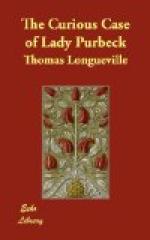If he had everything his own way in the criminal court and the torture chamber, Coke did not find his wishes altogether unopposed in his family. To begin with, he suffered the perpetual insult of the refusal on the part of his wife to be called by his name. If her first husband had been of higher rank, it might have been another matter: but both were only knights, and it was a parallel case to the widow Jones, after she had married Smith, insisting upon still calling herself Mrs. Jones. Lady Elizabeth defended her conduct on this point as follows:[3] “I returned this answer: that if Sir Edward Cooke would bury my first husband accordinge to his own directions, and also paie such small legacys as he gave to divers of his friends, in all cominge not to above L700 or L900, at the most that was left unperformed, he having all Sir William Hatton’s goods & lands to a large proportion, then would I willingly stile myself by his name. But he never yielded, so I consented not to the other.” Whether Hatton or Coke, as an Earl’s daughter she was Lady Elizabeth, by which name alone let us know her.
Campbell states that, after the birth of Frances, Sir Edward and Lady Elizabeth “lived little together, although they had the prudence to appear to the world to be on decent terms till the heiress was marriageable.” Coke had been astute enough to secure a comfortable country-house, at a very convenient distance from London, through Lady Elizabeth. Her ladyship had held a mortgage upon Stoke Pogis, a place that belonged formerly to the Earls of Huntingdon,[4] and Coke, either by foreclosing or by selling, obtained possession of the property. As it stood but three or four miles to the north of Windsor, the situation was excellent.[5] Sir Edward’s London house was in the then fashionable quarter of Holborn, a place to which dwellers in the city used to go for change of air.[6] As Coke and his wife generally quarrelled when together, the husband was usually at Holborn[7] when the wife was at Stoke, and vice-versa. It was almost impossible that Miss Frances should not notice the strained relations between her parents. Nothing could have been much worse for the education of their daughter than their constant squabblings; and, unless she differed greatly from most other daughters, she would take advantage of their mutual antipathies to play one against the other, a pleasing pastime, by means of which young ladies, blessed with quarrelsome parents, often obtain permissions and other good things of this world, which otherwise they would have to do without.
Lady Elizabeth found a friend and a sympathiser in her domestic worries. Francis Bacon, the former lover of her fortune, if not of her person, became her consoler and her counsellor. Let not the reader suppose that these pages are so early to be sullied by a scandal. Nothing could have been farther from reproach than the marital fidelity of Lady Elizabeth, but it must have gratified Bacon to annoy the man who had crossed and conquered him in love, or in what masqueraded under that name, by fanning the flames of Lady Elizabeth’s fiery hatred against her husband. Hitherto, Coke had had it all his own way. He had snubbed and insulted Bacon in the law courts, and he had snatched a wealthy and beautiful heiress from his grasp. The wheel of fortune was now about to take a turn in the opposite direction.




